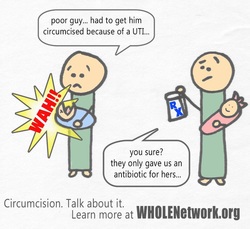
Many parents believe that circumcising their son in infancy is a kindness. They assume getting it done sooner will save him the pain of having to endure the procedure later on in life, but what we've found is that the opposite is true.
Foreskin Retraction
In infancy, the foreskin is fused tightly to the glans penis via a connective membrane known as the balano-preputial lamina. To perform a circumcision, the doctor must insert a probe and forcibly rip the foreskin away from the glans before it can be clamped and cut. This is extremely painful for the baby, not unlike ripping a fingernail from the nail bed. In adulthood, the natural foreskin retraction process will have already released the foreskin so that it is freely movable, eliminating this part of the procedure.
Issues with Breastfeeding
The postpartum period is already difficult time of adjustment for both mother and infant, and management of a post-surgical circumcision wound will add additional unneeded stress to the situation. Circumcision has been shown to interfere with breastfeeding, a complication that would not exist for circumcision in adulthood.
Effectiveness of Pain Management for Infant Circumcision
A report from the University of Alberta in Edmonton determined that up to 96% of babies circumcised in North America receive no pain medication whatsoever. For babies that do receive pain management, tylenol, sucrose (sugar water), EMLA cream, and dorsal penile nerve block are the various methods currently utilized. Numerous studies have been done examining these medications, and overwhelmingly the data concludes that these methods of managing infant circumcision pain do not work:
"Based on 35 clinical trials involving 1,997 newborns, it can be concluded that DPNB and EMLA do not eliminate circumcision pain... Trials of oral acetaminophen, sugar solutions, pacifiers, music, and other environmental modifications to reduce circumcision pain did not prove them effective." (Brady‐Fryer 2004)
Some will dismiss this point, claiming while the child may feel the pain, he won't remember it. However science has shown us that children do remember the pain of their circumcisions, and there have even been numerous accounts of adult men who remember. The least traumatic option is leaving this procedure to be performed in adulthood when use of general anesthesia guarantees the event can not be recalled, and the patient can request and safely take adequate post-surgical pain medication.
Circumcision Pain in Infancy Versus Adulthood
It's a common belief that circumcision is more painful if done in adulthood. However a 2012 study published in the Official Journal of the American Urological Association concludes that circumcision hurts less the older the patient is:
"We performed a prospective, observational cohort study in patients undergoing circumcision. Patients were asked to complete a questionnaire using a visual analog scale for pain... Conclusions: Pain is mild to moderate after circumcision in adults under general anesthesia with an intraoperative penile block. Severe pain is rare and mostly related to complications. Younger patients generally have more discomfort."

Aside from crying, an infant cannot communicate that he's in pain or if something is wrong. That's what makes acute complications of circumcision so scary. An infant will hemorrhage with as little as one ounce of blood lost, and with only 2.3 ounces of blood loss he will die. That's as much as a child could lose into his diaper on the way home after a circumcision! An estimated 117 baby boys die every year in the US from circumcision complications. Because circumcision is an unnecessary surgery, these deaths are 100% preventable.
Many of the complications caused by routine infant circumcision will not occur with adult circumcision for numerous reasons, primarily the wound is healing inside clean underwear rather than a urine and feces filled diaper. Meatal stenosis, which occurs in 9-10% of boys circumcised in infancy, is arguably the most common circumcision complication. It's caused by scar tissue building up where the boy's delicate urethral opening is exposed to urine and mechanical rubbing inside the dirty diaper.
The size of the patient is also an issue. It's very difficult on a tiny thrashing newborn to determine exactly how much tissue to take from the penis while still leaving enough behind to comfortably allow for growth and erections. Often too much tissue is removed, which will cause tight, painful erections as well as hairy scrotal skin being pulled up onto the shaft. An adult man can indicate exactly how much or how little tissue he'd like removed during his circumcision, thus eliminating all the guesswork.
Additional short-term complications from circumcision include: Infection, urinary retention, urethral fistula, dislodged Plastibell circumcision device, complications from anesthetics, pain, abnormal sleep patterns, excessive crying, and unwillingness to feed. Long term complications include adhesions, preputial stenosis, buried penis, curved penis, excessive scarring, keratinization, desensitization, erectile dysfunction, and sense of loss.
Likelihood of Him Ever Wanting or Needing the Procedure
If he doesn't get circumcised now, he's just going to need it done later, right? Wrong. "In Finland, where the circumcision rate is zero at birth, the risk of needing the foreskin removed later is one in sixteen thousand, six hundred sixty seven (1/16,667), an extremely rare event! The prepuce is invariably normal and almost never requires removal." -Doctors Opposing Circumcision Physicians Guide to the Normal Intact Penis
It's not uncommon to hear cautionary tales of young boys needing to be circumcised. But in almost every case, the issue was not the child's foreskin but rather a doctor who was ignorant about normal male anatomy. Dr. Paul Fleiss writes: "I often receive calls from distraught parents who say that a doctor insists that their little boy needs to be circumcised because there is something wrong. When they bring their son into my office, I almost always find that there's nothing wrong with the child's penis. Occasionally there's a slight infection, but that can be quickly cleared with an antibiotic cream. In all my years of practice, I've never had a patient who had to be circumcised for medical reasons.
When a doctor advises that your son be circumcised, it's usually because he or she is unfamiliar with the intact penis, misinformed about the true indications for surgical amputation of the foreskin, unaware of the functions of the foreskin, and uncomfortable with the movement away from routine circumcision."
According to the most recent World Health Organization estimates, approximately 70% of the world's male population is intact. That means the vast majority of males never need or choose to get circumcised. If given the choice, it's likely your son would fall into this category as well.
The Issue of Legal Consent: Who Should the Decision Belong To?
Does a parent have the legal right to consent to have their son's foreskin taken away without an immediate medical reason? Attorneys for the Rights of the Child has concluded they do not. "Numerous legal scholars have concluded that routine neonatal circumcIsion falls within the legal definition of child abuse and violates children's civil and human rights under national and international law. Consent to a procedure that is per se illegal is, of course, invalid regardless of the motives of the consenting party." (Svoboda, 2000)
Many men are upset that the most sensitive part of their penis was taken from them in infancy without their consent or any actual medical reason. (You can read their stories here and here.) When your son is born, you have no idea whether or not he'll even want to be circumcised. Rather than guessing wrong and leaving him to deal with the lifelong consequences of an irreversible decision, leave the decision for him to make for himself at the age of consent. If he feels strongly about having his foreskin removed, he can provide his consent and opt for the procedure to be done at that time.

Shouldn't He Be Circumcised Young So He Can Start to Reap the Benefits of Circumcision?
There have been many alleged benefits of circumcision since its start in the US in the 1800s. Over time, many of these claims have been debunked. Today, the most prevalent arguments the American Academy of Pediatrics give in favor of circumcision include: hygiene, social conformity, prevention of urinary tract infection, STDs, HIV, and penile prostate cancer. None of these issues are of any concern whatsoever to an infant, apart perhaps from hygiene and UTIs. Ironically, care and hygiene are made profoundly more difficult by circumcision. The difference in the rate of urinary tract infection between intact and circumcised boys is only about 1%. Given the high rate of risks and complications with circumcision, this is not a significant enough difference to justify the routine circumcision of infant boys. Urinary tract infections are rare and when they do occur, they respond well to antibiotics for both boys and girls. Amputation of tissue is not needed, especially when you consider the 12x higher rate of MRSA infection in circumcised boys.
Conclusions
Both the pain and rate of complications associated with circumcision are worse when the procedure is performed in infancy than in adulthood. Numerous legal authorities have determined that parents do not have the right to consent to circumcision on their infant son's behalf, and any of the highly disputed benefits of circumcision either do not apply in infancy and childhood or are not worth the risks of the procedure. Parents simply cannot go wrong with leaving the permanent and highly personal decision of whether or not to circumcise for their sons to make for themselves at the age of consent.

 RSS Feed
RSS Feed

